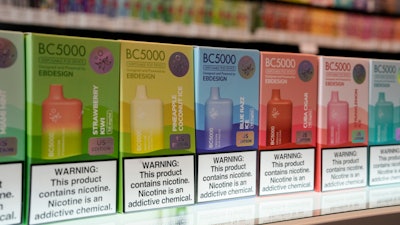
NEW YORK (AP) — Fewer high school students are vaping this year, the government reported Thursday.
In a survey, 10% of high school students said they had used electronic cigarettes in the previous month, down from 14% last year.
Use of any tobacco product — including cigarettes and cigars — also fell among high schoolers, according to the Centers for Disease Control and Prevention report.
"A lot of good news, I'd say," said Kenneth Michael Cummings, a University of South Carolina researcher who was not involved in the CDC study.
Among middle school student, about 5% said they used e-cigarettes. That did not significantly change from last year's survey.
This year's survey involved more than 22,000 students who filled out an online questionnaire last spring. The agency considers the annual survey to be its best measure of youth smoking trends.
Why the drop among high schoolers? Health officials believe a number of factors could be helping, including efforts to raise prices and limit sales to kids by raising the legal age to 21.
"It's encouraging to see this substantial decrease in e-cigarette use among high schoolers within the past year, which is a win for public health," said Brian King, the Food and Drug Administrations tobacco center director.
The FDA has authorized a few tobacco-flavored e-cigarettes intended to help adult smokers cut back but has struggled to stop sales of illegal products.
Other key findings in the report:
— Among students who currently use e-cigarettes, about a quarter said they use them every day.
— About 1 in 10 middle and high school students said they recently had used a tobacco product. That translates to 2.8 million U.S. kids.
— E-cigarettes were the most commonly used kind of tobacco product, and disposable ones were the most popular with teens.
— Nearly 90% of the students who vape used flavored products, with fruit and candy flavors topping the list.
In 2020, FDA regulators banned those teen-preferred flavors from reusable e-cigarettes like Juul and Vuse, which are now only sold in menthol and tobacco. But the flavor restriction didn't apply to disposable products, and companies like Elf Bar and Esco Bar quickly stepped in to fill the gap.
The growing variety in flavors like gummy bear and watermelon has been almost entirely driven by cheap, disposable devices imported from China, which the FDA considers illegal. Those products now account for more than half of U.S. vaping sales, according to government figures.
In the latest survey, about 56% of teens who vape said they used Elf Bar, trailed by Esco Bar and Vuse, which is a reusable e-cigarette made by R.J. Reynolds. Juul, the brand widely blamed for sparking the recent spike in teen vaping, was the fourth most popular brand, used by 16% of teens.
The FDA tried to block imports of both Elf Bar and Esco Bar in May, but the products remain widely available. Elf Bar has thwarted customs officials by changing its brand name, among other steps designed to avoid detection
On Thursday, the FDA announced another round of fines against 20 stores selling Elf Bar products. The agency has sent more than 500 warning letters to retailers and manufacturers of unauthorized e-cigarettes over the past year, but those citations are not legally binding and are sometimes ignored.
In the latest report, the CDC highlighted one worrisome but puzzling finding. There was a slight increase in middle schools students who said they had used at least one tobacco product in the past month, while that rate fell among high school students. Usually those move in tandem, said Kurt Ribisl, a University of North Carolina researcher. He and Cummings cautioned against making too much of the finding, saying it might be a one-year blip.
___
Perrone reported from Washington.






















